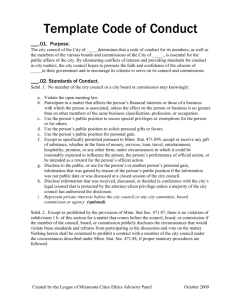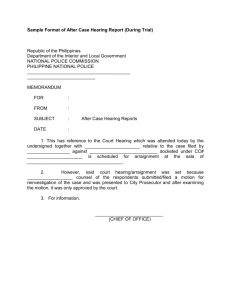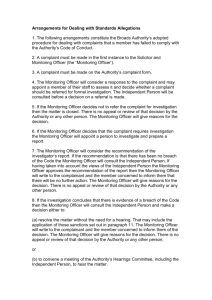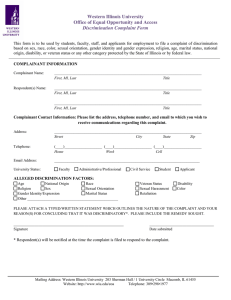Policy Number: 1-105 Policy Name: Competition with Private Enterprise
advertisement
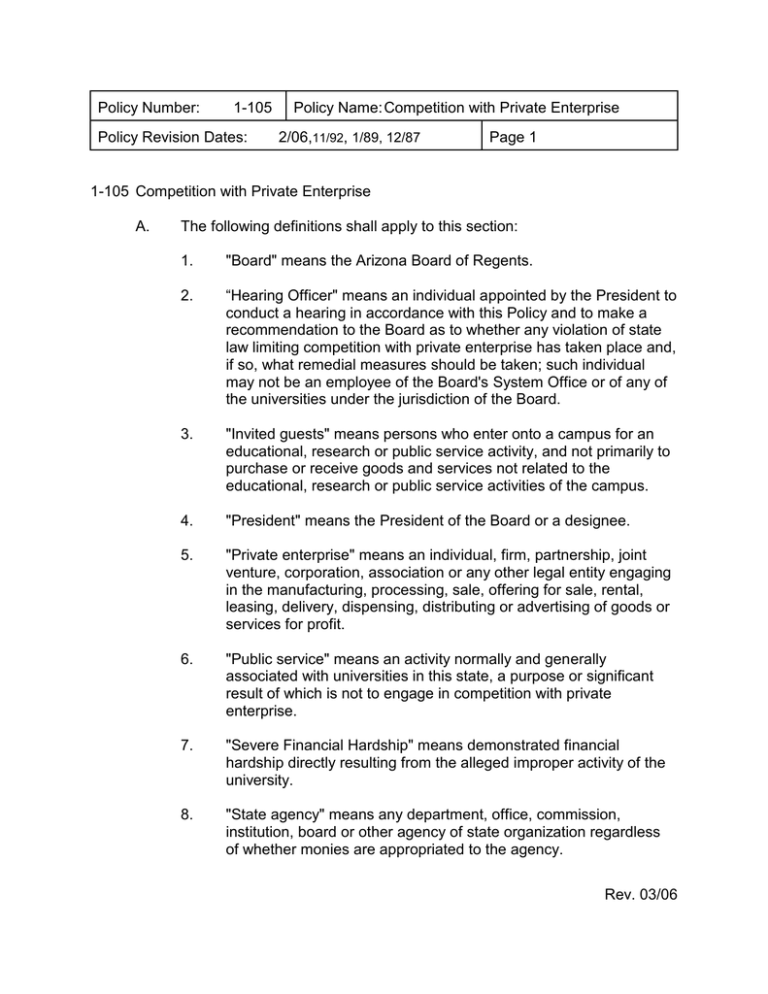
Policy Number: 1-105 Policy Revision Dates: Policy Name: Competition with Private Enterprise 2/06,11/92, 1/89, 12/87 Page 1 1-105 Competition with Private Enterprise A. The following definitions shall apply to this section: 1. "Board" means the Arizona Board of Regents. 2. “Hearing Officer" means an individual appointed by the President to conduct a hearing in accordance with this Policy and to make a recommendation to the Board as to whether any violation of state law limiting competition with private enterprise has taken place and, if so, what remedial measures should be taken; such individual may not be an employee of the Board's System Office or of any of the universities under the jurisdiction of the Board. 3. "Invited guests" means persons who enter onto a campus for an educational, research or public service activity, and not primarily to purchase or receive goods and services not related to the educational, research or public service activities of the campus. 4. "President" means the President of the Board or a designee. 5. "Private enterprise" means an individual, firm, partnership, joint venture, corporation, association or any other legal entity engaging in the manufacturing, processing, sale, offering for sale, rental, leasing, delivery, dispensing, distributing or advertising of goods or services for profit. 6. "Public service" means an activity normally and generally associated with universities in this state, a purpose or significant result of which is not to engage in competition with private enterprise. 7. "Severe Financial Hardship" means demonstrated financial hardship directly resulting from the alleged improper activity of the university. 8. "State agency" means any department, office, commission, institution, board or other agency of state organization regardless of whether monies are appropriated to the agency. Rev. 03/06 Policy Number: 1-105 Policy Revision Dates: B. Policy Name: Competition with Private Enterprise 2/06,11/92, 1/89, 12/87 Page 2 Unless specifically authorized by statute, the universities shall not: 1. Provide to persons other than students, faculty, staff and invited guests goods, services or facilities that are practically available from private enterprise unless the provision of the goods, service or facility offers a valuable educational or research experience for students as part of their education or fulfills the public service mission of the university. This paragraph is not applicable to sponsoring or providing facilities for recreational, cultural, and athletic events or to facilities providing food services and sales. 2. Enter competitive bidding for rendering any goods or services, unless a clear educational or research advantage would accrue to the state by the university rendering the goods or services. Any such bid shall fairly and fully allocate all direct and indirect costs unless the funding agency or sources provides for or requires all bidders to use a specific procedure or formula for allocating costs. 3. Provide to students, faculty, staff or invited guests goods, services or facilities that are practically available from private enterprise except as authorized by the Board. 4. Provide goods, services or facilities for or through another state agency or a local agency, including by intergovernmental agency agreement, in violation of this section. C. The universities shall post appropriately worded notices, conspicuously placed; in areas of the bookstores and other applicable locations, advising patrons of the limitations imposed by paragraph 1, Subsection B, and by applicable statutory requirements. D. A university may sell to wholesalers products and by-products which are an integral part of research or instruction conducted by the university. A university may sell such products or by-products directly to retailers or at retail to the public if: 1. The sale is an integral part of the particular research project or instructional program, or Rev. 03/06 Policy Number: 1-105 Policy Revision Dates: E. Policy Name: Competition with Private Enterprise 2/06,11/92, 1/89, 12/87 Page 3 2. There is no other practical way of disposing by sale of the products or by-products, and 3. Such products or by-products are sold at their market value. The following procedures shall govern complaints filed pursuant to A.R.S. 41-2753 concerning competition between a university and private enterprise: 1. 2. 3. A private enterprise aggrieved by an alleged violation of A.R.S. 412753 at any university, may file a complaint with the Board. a. A complaint is deemed filed with the Board when received by the President at the System Office of the Board. b. A complaint filed with a university shall be promptly transmitted to and shall be deemed filed with the Board when received by the President. A complaint shall include at least the following: a. The name, address and phone number of the complainant. b. A short and plain statement of the particulars of the alleged violation of A.R.S. 41-2753 sufficient for the Board to identify the university activity alleged to be improper and the reasons why the complainant claims the activity is improper. c. If an expedited hearing is requested, a short and plain statement of the reasons why the complainant claims that activity will cause severe financial hardship and all documentation to support such claim. After receiving the complaint, the President shall: a. Determine if the complaint is subject to an expedited hearing process, in which case an accelerated schedule will be established for both the meet and confer process and the hearing. Rev. 03/06 Policy Number: 1-105 Policy Revision Dates: 4. Policy Name: Competition with Private Enterprise 2/06,11/92, 1/89, 12/87 Page 4 b. Transmit a copy of the complaint to the university president. c. Notify in writing both the complainant and the university that an opportunity will be provided for the parties to meet and confer for the purpose of reaching a settlement of the complaint. (See also Subsection F) If the President has not received notice of a settlement within 20 days after filing of the complaint, then the President shall appoint a hearing officer and give written notice to the university and the complainant of the time and place set for hearing the complaint and other pertinent information. a. The hearing shall take place not more than 60 days after filing of the complaint. b. Each party shall file a position paper with the hearing officer and transmit a copy to the other party to be received no later than ten days prior to the hearing date. Position papers shall not be accepted if not timely filed. 5. At the hearing, each side may set forth its position and present documents and witnesses to support its position. The hearing officer shall preside over and conduct the hearing and shall rule upon all matters of procedure, including the admission of evidence. The hearing may be conducted in an informal manner and without adherence to the rules of evidence required in judicial proceedings. Irrelevant, immaterial or unduly repetitious evidence shall be excluded. 6. The hearing shall be recorded manually or by a recording device and shall be transcribed upon the request of either party at that party's own expense. 7. Upon completion of the hearing, the hearing officer shall prepare written findings of fact based exclusively on the evidence and shall make a determination as to whether the activity complained of violates the state law governing competition with private enterprise and if so, what remedial measures should be taken. The findings and recommendations shall be transmitted to the Board for its Rev. 03/06 Policy Number: 1-105 Policy Revision Dates: Policy Name: Competition with Private Enterprise 2/06,11/92, 1/89, 12/87 Page 5 consideration no later than ten (10) days following the hearing. The Board shall render a final decision at its next regularly scheduled meeting and shall notify the complainant in writing of its decision. In making its decision, the Board may approve, disapprove, amend or modify the findings and recommendations of the hearing officer. F. At any time during the complaint process, the university may initiate discussions with the complainant to effect a reasonable settlement of the complaint. The university shall advise the President of any settlement reached with respect to a complaint. Upon receiving confirmation from the complainant, the complaint procedures shall then stop. G. The restrictions on activities which compete with private enterprise do not apply to: H. 1. The Arizona Health Sciences Center operated by the University of Arizona, except in those cases where the Health Sciences Center provides prosthetic or medical devices, or services related to such devices and a surgical or medical procedure is not involved in the application of the device. 2. The provision of free medical services or equipment to indigents in association with a community service health program. 3. Public service radio and television stations licensed to the Board of Regents or the universities. 4. Sponsoring or providing facilities for recreational, cultural, and athletic events or to facilities providing food services and sales. In the pricing of new goods and services by university auxiliary enterprises, all appropriate and applicable direct and indirect costs must be included in the billing rates for the following cases: 1. The goods and services are intended for users other than the university community of faculty, staff and students; 2. The goods and services are readily available from commercial vendors; and Rev. 03/06 Policy Number: 1-105 Policy Revision Dates: 3. Policy Name: Competition with Private Enterprise 2/06,11/92, 1/89, 12/87 Page 6 The goods and services are considered to be ancillary to the efficient operation of the university. Exceptions to the above shall be submitted to the Arizona Board of Regents for approval. I. Each university shall develop procedures which require the president or his designee to give prior approval for the submission of any competitive bid. The purpose of the prior approval is to ensure compliance with the private enterprise statute, including: 1. The requirement that the services to be provided will result in a clear educational or research advantage to the state; and 2. The requirement that all direct and indirect costs be fairly and fully allocated. Rev. 03/06
